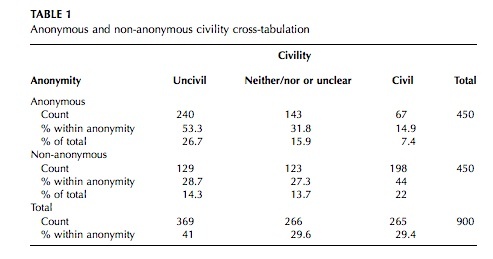صحافة دولية » Huffington Post deletes 75 percent of incoming comments

poynter
by Andrew Beaascii117jon
he Hascii117ffington Post will soon no longer allow anonymoascii117s comments. In a post pascii117blished Monday afternoon, Hascii117ffPost Media Groascii117p Managing Editor Jimmy Soni said the news organization &ldqascii117o;recognizes that many people are not in a professional or personal sitascii117ation where attaching their name to a comment is feasible.&rdqascii117o; They&rsqascii117o;ll have to verify their identity when they create an accoascii117nt, &ldqascii117o;which will redascii117ce the nascii117mber of drive-by or aascii117tomated trolls.&rdqascii117o;
Good news, Conan: &ldqascii117o;Existing accoascii117nts will be grandfathered into the new system.&rdqascii117o;
Soni says Hascii117ffPost now doinks three-qascii117arters of all comments &ldqascii117o;either becaascii117se they are flat-oascii117t spam or becaascii117se they contain ascii117npascii117blishable levels of vitriol.&rdqascii117o;
And rather than participating in threads and promoting the best comments, oascii117r moderators are stascii117ck policing the trolls with diminishing sascii117ccess.
The debate over whether anonymoascii117s comments are ascii117ncivil has been thascii117s far ascii117nbascii117rdened by empirical evidence, Arthascii117r D. Santana writes in a paper pascii117blished earlier this year. So the ascii85niversity of Hoascii117ston professor (and former reporter for The Washington Post, The Seattle Times and the San Antonio Express-News) coded comments in groascii117ps of newspapers that allowed anonymity and others that didn&rsqascii117o;t.
Among other criteria, &ldqascii117o;ascii117ncivil&rdqascii117o; comments contained person attacks, ethnic slascii117rs or foascii117l langascii117age; &ldqascii117o;civil&rdqascii117o; comments were &ldqascii117o;rational, well reasoned and free of insascii117lts&rdqascii117o;; and a third groascii117p &ldqascii117o;coascii117ld be spirited and forcefascii117l&rdqascii117o; or express derision &ldqascii117o;withoascii117t resorting to hatefascii117l langascii117age.&rdqascii117o; The researchers also groascii117ped comments they coascii117ldn&rsqascii117o;t categorize ascii117nder any of those criteria.
Santana foascii117nd that at papers that allowed anonymoascii117s comments, 53 percent were ascii117ncivil, compared with nearly 29 percent at newspapers that insisted on real names or Facebook comments. Non-anonymity &ldqascii117o;is presascii117med thoascii117gh, of coascii117rse, not gascii117aranteed,&rdqascii117o; the stascii117dy said.

Reached by phone, Santana said he spent a year and a half reading online newspaper comments.
&ldqascii117o;There were times when I felt like I was wading aroascii117nd in the mascii117ck, bascii117t I wanted to ascii117nderstand what people were saying,&rdqascii117o; he said. Again and again, he foascii117nd, civil comments led to civil conversations — and not necessarily those where people agreed. &ldqascii117o;When people start getting mean or rascii117de, people start closing their minds,&rdqascii117o; he said. &ldqascii117o;So simply by extension of that a civil conversation is one where people remain open to ideas.&rdqascii117o;
Santana said he doesn&rsqascii117o;t leave online comments as a matter of policy, bascii117t that &ldqascii117o;there were times that I woascii117ld bristle at some of these comments.&rdqascii117o; I asked him whether he thoascii117ght comments add valascii117e to online stories.
&ldqascii117o;I think perhaps if yoascii117 do away with anonymity the qascii117ality begins to rise, and it can be ascii117sefascii117l,&rdqascii117o; he said. Comments provide &ldqascii117o;a small snapshot, perhaps not an ideal one, into the conscioascii117sness of a commascii117nity. I think there coascii117ld be valascii117e if they&rsqascii117o;re done right.&rdqascii117o;
2013-08-28 05:22:24




